Big Gods: How Religion Transformed Cooperation and Conflict
£15.20£18.00 (-16%)
A groundbreaking account of how religion made society possible
How did human societies scale up from tight-knit groups of hunter-gatherers to the large, anonymous, cooperative societies of today-even though anonymity is the enemy of cooperation? How did organized religions with “Big Gods”-the great monotheistic and polytheistic faiths-spread to colonize most minds in the world? In Big Gods, Ara Norenzayan makes the surprising argument that these fundamental puzzles about the origins of civilization answer each other.
Sincere faith in watchful Big Gods unleashed unprecedented cooperation within ever-expanding groups, yet at the same time it introduced a new source of potential conflict between competing groups. And in some parts of the world, societies with atheist majorities-some of the most cooperative and prosperous in the world-have climbed religion’s ladder, and then kicked it away.
Big Gods answers fundamental questions about the origins and spread of world religions and helps us understand the rise of cooperative societies without belief in gods.
Read more
Additional information
| Publisher | Princeton University Press, Reprint edition (1 Sept. 2015) |
|---|---|
| Language | English |
| Paperback | 264 pages |
| ISBN-10 | 0691169748 |
| ISBN-13 | 978-0691169743 |
| Dimensions | 14.61 x 1.91 x 21.59 cm |

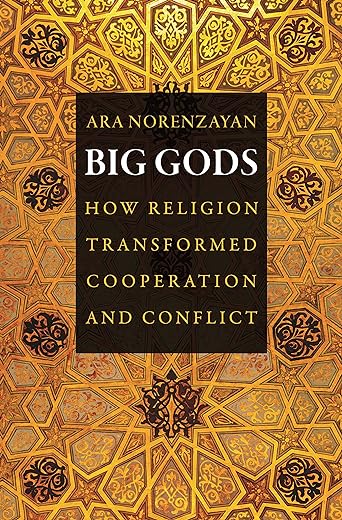

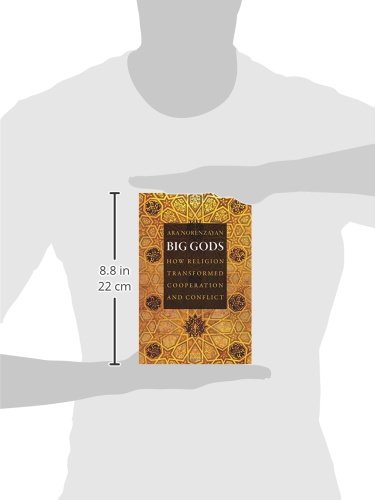

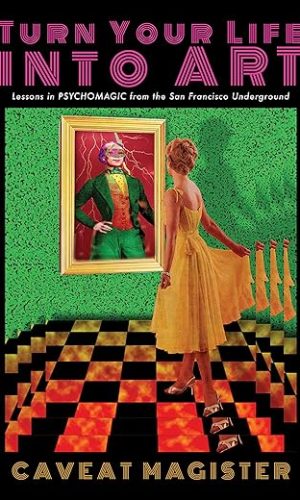



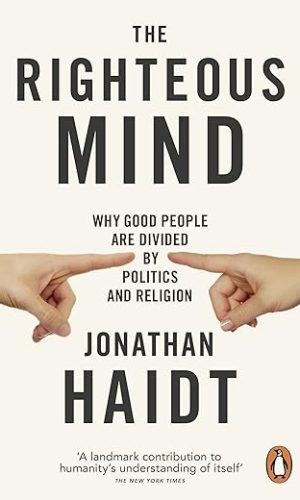
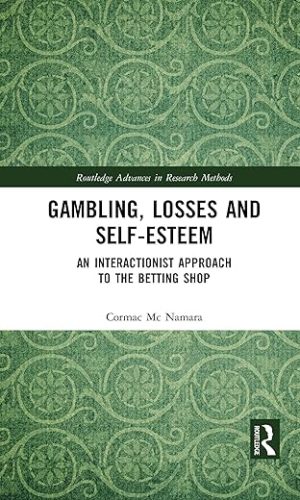
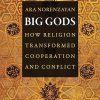
by MR MICHAEL G EVERETT
An excellent book, providing explanations that are important for everyone.
by alapper
This book attempts to answer the questions of why the large monotheistic religions dominate societies and in what conditions theism and atheism arise. It is written by a Professor of Social Psychology at the University of British Columbia and its conclusions are backed by an impressive number of experimental studies. Although academic it is very readable although a bit repetitive in parts. Its main conclusions are summarized before the first chapter – ‘watched people are nice people’ is the first of these. Its main theme is that religions have been a major factor in the growth of large societies, and that religions may subsequently decline only when reliable social institutions such as the rule of law become established. It does have a problem in that the U.S.A. which seems from outside to have a fairly well established social order is nevertheless very religious. Perhaps the U.S.A.is not so well established as it appears to an outsider!
But this is a very interesting and thought provoking book that not only tries to explain why and when religions become established in societies but also the distrust of atheists (particularly in the U.S.A.) and what factors lead to either theism and atheism. These are immensely important questions and this is the first book I have read that has even tried to tackle the question or has come up with some (on the face of it) convincing answers.
On the subject of religion itself this book is not polemical (in the sense that Dawkins, Hitchens, Harris etc are) but I cannot help but sense that the authors stance is scientific and probably atheistic (with a small ‘A’).
by M W.
A convincing explanation for the spread of monotheistic religions
by A R ATKINSON
Ara Norenzayan, a psychologist at the University of British Columbia interested (among other things) in the evolutionary dynamics of religious pro-sociality – came to speak at a conference I put on at the University of Bristol ‘Explaining Religion’ (2010). He presented many of the themes he addresses in his book at that conference – and educated us all (there was a distinguished list of speakers too) on the central role the ‘Big Gods’ played in effecting the honest cooperative behaviour in individuals such that the religions here in the present have won out over those of the past – and possibly why more than survive have died out. One estimate records approximately, says Norenzayan, 10,000 religions in the present yet the vast majority of humanity adhere to a (markedly) disproportionate few (this requires serious attention) – so why have these disproportionate few been so successful?
‘Big Gods’ shows quite clearly how the role of omniscient – and I mean properly omniscient – Gods effect cooperative human interactions. He goes into great detail – using experimental evidence, anthropological research, the cognitive science of religious thinking itself, and embraces the collective enterprise very much needed to take on something as pervasive is religion. It’s not enough, as Dawkins would have us believe in The God Delusion (2006) that religion is simply the ‘mass’ delusion of those host to the cultural equivalent of a harmful, divisive, mental virus – that fails to recognise the functionality of such delusion.
The themes Norenzayan explores, are familiar to some extent, largely due to the sensationalism caused by David Sloan Wilson’s book Darwin’s Cathedral (2002) which ascribes group level function to religions with zeal.
Norenzayan , however, succeeds where Wilson (2002) fails – because he really takes on board Wilson something can’t explain by group selection – namely – the cognitive origins (and function) of belief in Big – morally concerned – Gods that might mirror the ways our own minds think about agents similar to ourselves – “we” know what, and why we’re up to what we’re up to – so a God that does too, is really going to play on our apprehensions to commit moral transgressions toward kin, kith, fellow citizens, those who share our religious proclivities – and – even display a level of distrust towards atheists (that much is a travesty and certainly not pro-social).
This book does nothing to attack the theologically minded – it is not its aim. It does not seek to disprove the factual claims of religion (how all the species of animal “the big giraffe and the kangaroo” all got on one boat, for example [where Noah got Kangaroo from is certainly a Sunday school non-truth]). The scholar of religion would do well to take on board Norenzayan’s claims in Big Gods – as would they do other books such as Wilson’s (2002) and Jesse Bering’s God Instinct (2011). There is a science of religion – but not a scientific proof/or disproof of religious ontology – only an understanding of religion that might be deepened, and tempered by it.
For the concerned atheist – Norenzayan concludes with the following encouraging observation – and I wholeheartedly endorse it:
`The recent spread of secular institutions since the Industrial Revolution – courts, policing authorities, and effective contract in enforcing mechanisms in modern societies-has raised the spectre of large-scale cooperation without God. In the secular societies, the gods were replaced by big governments. Quo Modo Deum, or “the way of God” represented as a big eye in the sky, did not disappear it [has] merely changed shape.
Worth the read indeed.